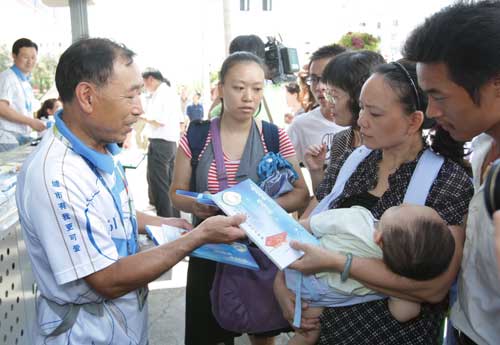Expo volunteers continue to welcome city visitors
 |
| A volunteer (left) for the Expo 2010 Shanghai distributes small gifts to tourists in the street on Sept 1. |
Volunteers for the Expo 2010 Shanghai will still welcome and help visitors after the fair ends as the city uses the Expo legacy to make it a better place to live.
Many of the 100,000 volunteers serving at key transportation hubs, commercial outlets and tourist attractions will continue to help visitors after Oct 31 to make the city more tourist friendly, Li Qingchuan, a press officer in charge of volunteer work of the Expo, told China Daily in an exclusive interview.
But the exact number of volunteers to remain has not been decided yet, he said, adding that it will take some time for the city to develop a sustainable mechanism for offering volunteer services.
"To be a truly international city, Shanghai needs regular volunteer service to optimize its service functions and make lives here easier and more enjoyable to visitors," said Li.
"But the service offered during and after the Expo might be different, and also legislation may be needed to protect the rights of volunteers in case of any physical injury or other losses."
The Expo has recruited about 80,000 volunteers who serve within the Expo Garden and an additional 100,000 offering help ranging from direction guidance, translation and first aid at 1,000 information booths in the city. The volunteers in the Expo Garden will be dispersed after the event, said Li.
Like their predecessors serving the Beijing Olympic Games in 2008, volunteers for the Expo, mostly students, have impressed worldwide visitors during the past five months for their enthusiasm and commitment to volunteerism. Numerous stories have been told of selfless help offered by China's younger generation, which at times has been considered spoiled and selfish.
Public calls for voluntary services to continue after the Expo has been strong and some residents have even suggested that Shanghai designate April 30 an annual "Expo Day" to promote its legacy of a green economy and the spirit of innovation and volunteerism.
"I'll be glad to continue to serve as a volunteer in the city if necessary, even after I graduate and find a job," said Tao Tao, a student volunteer at the city's railway station. "I'm sure many people would agree with me that volunteers have made our lives better."
"We should give credit to the rise of volunteerism among the Chinese public, as demonstrated both during the Beijing Olympics and in the wake of the deadly natural disasters in the past two years," said Li.
"And we are happy to see that more youths are now willing to offer voluntary service to make a difference in the world."
 0
0 






